
Some football matches that have ended 0-0 might seem boring on paper but have actually been thrilling for the spectator. Others that have finished 5-0 have actually been a bit duller than you might think because of the domination of one side over the other.
Regardless, football is an incredibly exciting sport in its own right. Once you understand the rules and how the game works you can appreciate both the minutiae of tactical changes as well as the way matches can ebb and flow as the ninety minutes tick by.
What takes football to the next level, though, is when the stakes are high. Obviously one of the main ways that can happen is if the game means something; a cup final, for example, or a match that might result in the losing team being relegated out of the division.
One of the other ways is if the two clubs involved have a rivalry that means the game becomes about so much more than the result itself. There are some brilliant rivalries in world football, so it’s only right that we have a look at the best of them.
World Football’s Great Rivalries
Given the global nature of football it’s fair to say that there are plenty of good rivalries that we can have a look at.
You might think that the majority of them involve inter-city clubs hating each other over the battle for supremacy within their own town, but that’s not always true.
Here’s why:
Liverpool v Manchester United
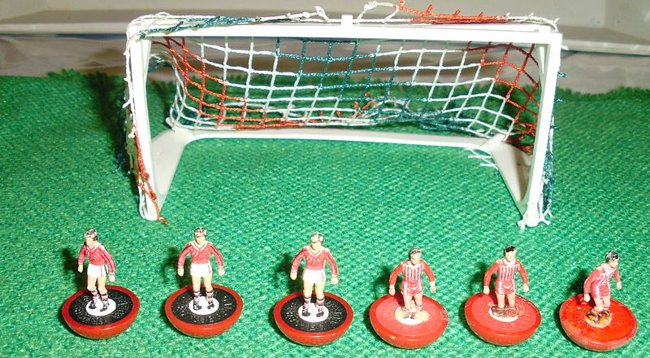
When it comes to English football there is no greater rivalry than that of Liverpool and Manchester United. As much as Everton and Manchester City supporters might try to stake a claim against their city neighbours, it’s the Red Devils and the Liver Birds that dislike each other the most. If you consider the League Cup, FA Cup, top-flight league, UEFA Cup (now the Europa League) and European Cup (or Champions League) to be the important trophies that English clubs can win then these two share 80 between them. That’s 41 for Liverpool and 39 for United, if you’re wondering.
The rivalry is also about so much more than football. The two cities are about forty miles away from each other and for all that they have in common there is also a great cultural divide that separates them. It’s widely accepted that the inter-city rivalry began properly in 1894 when the Manchester Ship Canal went into operation. It was built by Manchester-based merchants who were annoyed by the amount of money they were being forced to pay to import and export goods via Liverpool. Add in Liverpool’s football success in the 1980s and Manchester United’s in the 1990s, combined with Alex Ferguson’s determination to ‘knock them off their f*cking perch”, and you’ve got one heck of a rivalry.
Celtic v Rangers
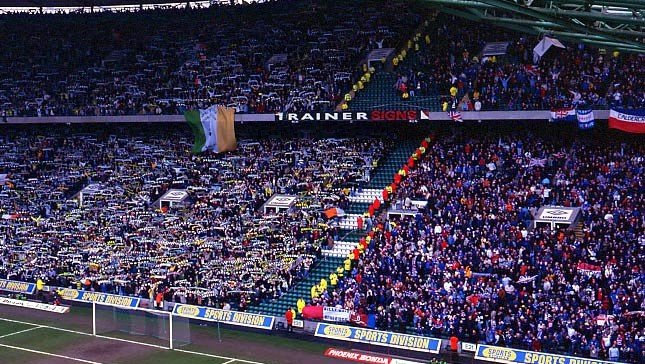
If Liverpool v Manchester United is a fiery rival South of the border then it’s nothing when compared to the Celtic and Rangers match up in Scotland. When the two Glasgow clubs go head-to-head the game is known as ‘The Old Firm’ match and it’s fair to say that over the years its influenced political, social and religious thought in Scotland. They are the two most successful clubs North of the border and it’s estimated that they’re worth about £120 million to Scotland’s economy.
Interestingly the rivalry itself has more of a basis in life in Northern Ireland than Scotland. The difference is a religious one, with Rangers supporters typically being Protestants and Celtic’s being Catholics. In amongst the religious differences comes connections to politics and how connected to Britain or Ireland each set of supporters feels. Sufficed to say it’s too complicated to get into here, but when religion comes into the argument it makes a dispute about a ship canal seem rather quaint.
Palmeiras v Corinthians
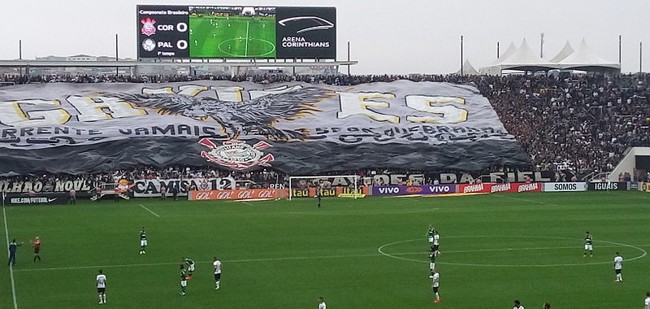
Our first departure from British shores takes us all the way over the Brazil. The Paulista Derby is one of the most violent and disruptive in South American football, which really is saying something. It stems from when members of Corinthians left the Sao Paulo club to form their own team, one that would become Palmeiras. They are Brazil’s most successful clubs and the importance of each game between them is shown by their supporters reactions of the pitch.
Riots are a reasonably common occurrence when the two sides go up against each other, as are fights between fans. This has gotten so bad in recent years that a supporter was even shot dead before the derby back in 2012. Players for each side have to think twice before heading out in public, with assaults on them by opposition fans not exactly unheard of. We’re not suggesting that the stakes get higher with each rivalry we mention, but deaths have thankfully been few and far between when it comes to both Liverpool v United and Celtic v Rangers.
Arsenal v Tottenham Hotspur
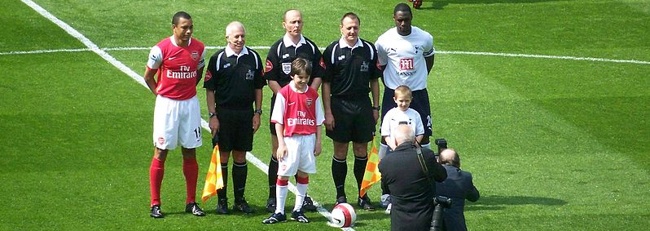
Back to England, then, and this time to the capital. It would be untrue to suggest that this rivalry is mostly about geography, but that’s definitely a big part of it. Spurs were the North London club when football was in its formative years. Arsenal were based in Plumstead in South-East London, close to Greenwich. Then in 1913 they moved to Arsenal Stadium in Highbury, North London – right onto Tottenham’s patch. What had previously been a reasonably friendly match-up suddenly became more intense as each club made efforts to own the ‘bragging rights’ for the local area.
In 1919 things got even worse when the First Division was expanded from 20 teams to 22. Chelsea had finished 19th and should have been relegated but were allowed to remain in the top-flight, leaving one space left. Spurs felt that should have gone to them as the 20th placed team but instead the vote went to Arsenal, who had finished fifth in the Second Division that season. Fume ensued. Over the following decades the pendulum of success and power swung from one club to the other, with Arsenal being the more successful of the two in recent times. That hasn’t helped to diminish the rivalry any, mind.
Barcelona v Real Madrid
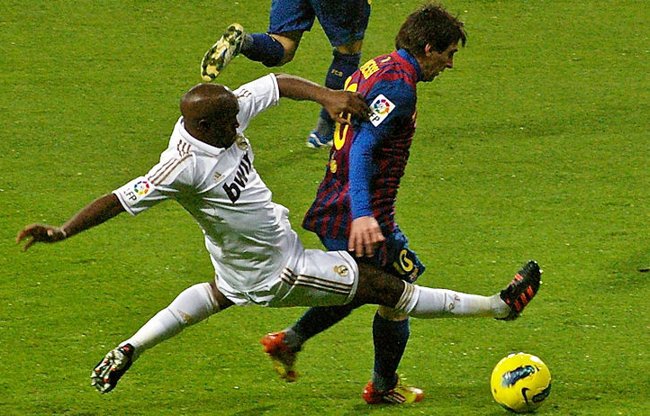
Nothing breeds contempt like shared success. Atletico Madrid fans might say that they hate Real Madrid more than Barca supporters do, but the fact that Real and Barcelona are the two most successful clubs in Spain and Atletico have been relatively unsuccessful in comparison puts paid to that idea. Since 1952 it has been rare for the winners of La Liga to be a team other than one of those that competes in El Clásico. Barcelona have won twenty of them at the time of writing and Real have picked up thirty in reply. That should tell you everything you need to know.
It’s not just a matter of trophies, however. As well as a clash of footballing philosophies (Real Madrid has long been seen as the team of ‘Galacticos’, buying titles, whilst Barcelona have tried to play the best football in the country in order to win) there’s also been a political dimension to the rivalry. When Francisco Franco became dictator in Spain his National Faction but Barcelona at the top of its list of organisations that needed to be ‘purged’. Barcelona fans weren’t keen on Franco, unsurprisingly; both the city and the football club were seen as being opposed Franco and his regime.
Likeable Football Clubs
As much as there are plenty of huge rivalries throughout world football there are also plenty of inoffensive clubs that most people feel rather neutral about. In some cases this is because of their geographical location, whilst in others it’s because there’s just not very much to dislike about them.
An example of a geographically neutral club would be the likes of Tranmere Rovers. What draws the attention regarding Tranmere is that they’re based on Merseyside, yet their location on the Wirral peninsular means that they’re not really an enemy of Liverpool or Everton. They exist on the outside of that rivalry, soaking up any folk that want to watch football but don’t want the stress of having to hate another club all of the time.
Another club that sort of ticks that box is Fulham. The Cottagers are based in South-West London, but the truth is that they’ve never really been caught up in the sort of London derbies that most other sides based in the capital have. Sure, the likes of Chelsea will be keen to beat them, but there’s not the same fire in their belly as their is against more successful sides such as the two that participate in the North London Derby or West Ham.
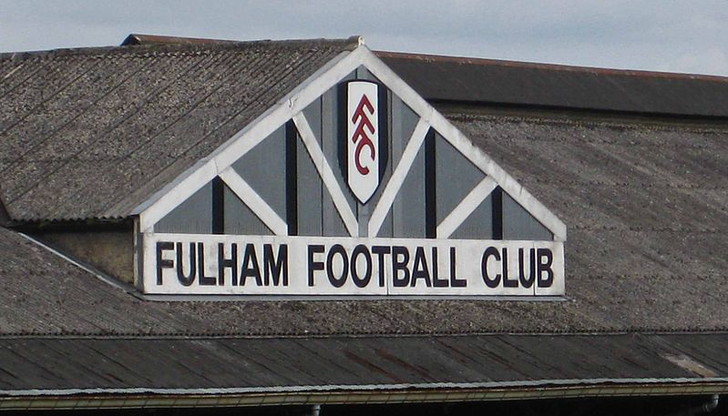
Portsmouth and Southampton may not be happy with the idea of Bournemouth being put in a bracket of clubs that neutrals don’t mind, but there you go. The Cherries have spent most of their existence bobbing around the lower tiers of the Football League, not reaching the English top-fight for the first time until 2015. Their promotion through the leagues was reasonably rapid and their inoffensive set-up and management means that most people actually quite like them.
It’s perhaps a touch controversial to suggest that Newcastle are a team that nobody minds; after all their derby with Sunderland could easily have appeared in the list of famous rivalries above. It’s also fair to say that the Magpies lost a lot of love during the tenure of Mike Ashley as their owner, owing to the terrible way in which the Sports Direct boss seemed to run the club. Yet there can be no question that for a time Newcastle were a lot of people’s ‘second team’ in England. In the 1990s they played some of the best attacking football in the country, coming close to winning the Premier League in 1996 but winning plenty of hearts in the process.
Teams Everyone Loves To Hate
Just as there are plenty of sides that people don’t mind, there are also more than a couple of teams that everyone loves to hate.
Leeds United fit nice and snugly into that bracket. They gained some great success in the 1960s and 1970s under the management of Don Revie, but it was the style of their football that ruffled so many feathers. Revie had them playing a type of football that can best be described as ‘physical’, but was often rough and violent. He won, but the club has had the tag ‘dirty Leeds’ ever since.
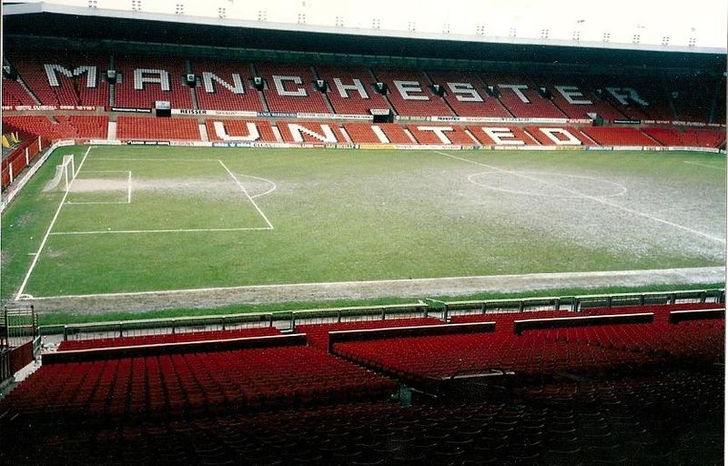
When Roman Abramovich bought Chelsea in 2003 he changed the face of British football forever. A side from West London that had won one First Division title, three FA Cups and two League Cups prior to his arrival was suddenly the richest side in the world. They brought in a manager in José Mourinho who seemed to specialise in winding up opposition fans at the same time that he won over the press and the Blues spend millions buying the best players in the game. Suddenly a side that nobody cared about was winning everything in sight and no one but Chelsea supporters liked it.
Another side that has always been the darlings of the press even when they weren’t successful is Manchester United. Nowadays they’re known as a behemoth of the Premier League, but that wasn’t always the case. Under the management of Alex Ferguson they won trophy after trophy but lost more and more neutrals along the way. Perhaps it was because of a perceived arrogance from the team, personified in Eric Cantona’s flicked up collar. Maybe it was down to the fact that they always seemed to get refereeing decisions, to the point where the manager had the period at the end of the game named after him. Whatever the reason, Manchester United remain a side that everyone’s delighted to see lose.
